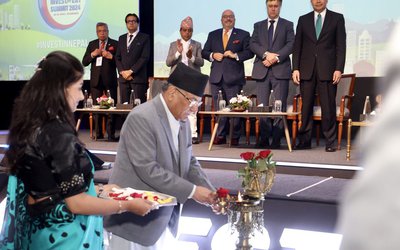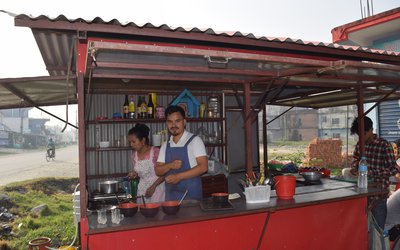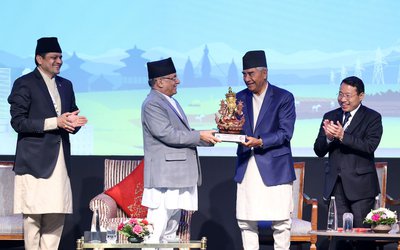Violence against women and girls is one of the most common human rights violations around the world. According to UNFPA Nepal, it is estimated that one in three women will experience physical or sexual abuse in her lifetime. A study conducted by the Prime Minister’s Office in Nepal in 2012 revealed that almost half of women (48%) had experienced violence at some time in their lives, and 28% had experienced violence in the past 12 months – emotional violence (40%) was the most commonly reported type of violence followed by physical (27%), sexual (15%), and economic abuse (8%).
Countries across the world have passed laws to attempt to ensure civil, political, economic, social, and cultural rights for all people. So why is behavior that suppresses women’s human rights still so widespread not just in Nepal, but across the world? One place to look is in the mirror: many, perhaps all, of us are probably guilty of committing a micro-aggression. “Micro-aggression” is a term that has been used in sociology for over 40 years, and can be defined as the everyday verbal and non-verbal comments or actions that intentionally or unintentionally imply hostile, derogatory, or negative messages toward people based solely on their marginalized status or lack of power. For example, micro-aggressions could be comments about a person’s race, ethnicity, gender, age, body type, religion, sexual orientation, disability, and so on, made to make the recipient of a comment feel inferior to the speaker. Jokes about a woman’s body, dress, manner of speaking, or ability are micro-aggressions designed to make a woman feel that she has done something wrong and should change her behavior. In fact, it is everyone who perpetuates micro-aggressions who needs to become aware of our behavior and remedy our harmful habits.
Micro-aggressions can be internalized by people who experience them regularly. Suzannah Weiss writes: “All the sexist micro-aggressions women face on a daily basis add up to something more than just a single instance of harassment or one off-handed comment. After days, weeks, months, and years of being objectified, shamed, policed, and stereotyped, women grow to feel inferior and unsafe. In fact, we often learn to adopt sexist attitudes toward ourselves.” One notable example in Nepal could be the practice of chhaupadi, or menstrual exclusion. The death of 26-year-old Achham women just this week who died while sleeping in her chhaupadi shed proves that practices that become normalized by individuals and families can have very serious negative consequences.
Other examples of micro-aggressions can be found in the labor market. In Europe, 40% of women have experienced unwanted sexual advances, physical contact, or harassment at work. The acts that may precede this harassment, however, usually go unmeasured, such as unequal hiring practices, wage gaps between men and women with the same jobs, or assumptions about men’s and women’s abilities. In Nepali newspapers, you can find daily vacancy ads that specify the gender of the person being sought for a specific job, such as “Receptionist wanted – female” and “Manager Position – male.”A vacancy ad in a major national newspaper in August described a school’s preference for a teacher: “Preference will be given to a lady teacher with keyboard skills and good vocal.” An ad for male-only security guards just below that ad displayed the salary for security guards – which was double the salary for the female teacher. Ads such as these enshrine perceptions that only men can do certain jobs while only women can do others. These incorrect and unfair assumptions may also result in men consistently getting interviewed and hired for (higher paying) managerial jobs while women are assumed to be better suited to (lower paying) receptionist jobs. Such assumptions are micro-aggressions that embed gender inequality in our minds and workplaces.
Government bodies, I/NGOs, and individuals are currently acknowledging the annual 16 Days of Activism Against Gender-based Violence. During the 16 days spanning November 25 (International Day for the Elimination of Violence against Women) to December 10 (International Human Rights Day), hundreds of events and programs are happening across Nepal organized by various stakeholders. Nepal’s national slogan for these 16 Days is “Peace in the home is the basis for peace in the world: A violence-free society for sustainable development.”So during these 16 Days of Activism, look around and ask if there are any small ways you can make your home, your school, your microbus, your workplace, and your world a more equal place for everyone. A small change in behavior, speech, or perspective– a micro-change to remedy a micro-aggression – could make a big difference in the long term.
Amanda Peskin is a VSO international volunteer serving as a gender advisor at the National Women’s Commission. VSO Nepal is currently conducting research on the mitigation of gender-based violence in Nepali communities with high out-migration. Both activities are part of VSO's Gender and Inclusive Governance program of work
- Time Off for Working Mothers in Nepal
- Sep 09, 2016
















